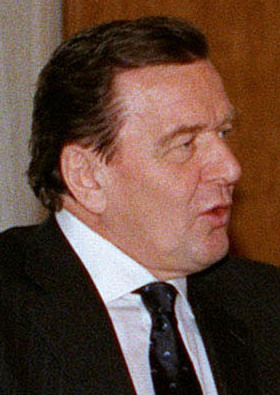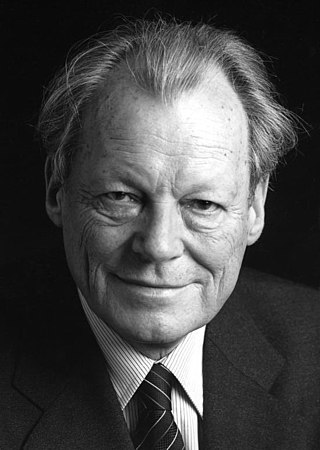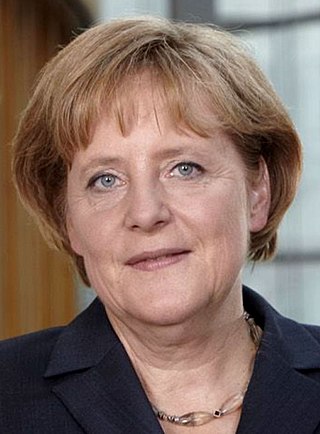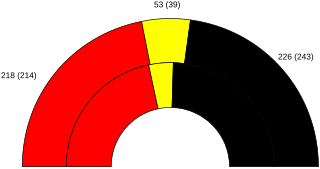
The Christian Social Union in Bavaria is a Christian democratic and conservative political party in Germany. Having a regionalist identity, the CSU operates only in Bavaria while its larger counterpart, the Christian Democratic Union (CDU), operates in the other fifteen states of Germany. It differs from the CDU by being somewhat more conservative in social matters, following Catholic social teaching. The CSU is considered the de facto successor of the Weimar-era Catholic Bavarian People's Party.

The Free Democratic Party is a liberal political party in Germany.

Germany is a democratic and federal parliamentary republic, where federal legislative power is vested in the Bundestag and the Bundesrat.

The Christian Democratic Union of Germany is a Christian democratic and liberal conservative political party in Germany. It is the major catch-all party of the centre-right in German politics.

Federal elections were held in Germany on 27 September 1998 to elect the members of the 14th Bundestag. The Social Democratic Party (SPD) emerged as the largest faction in parliament for the first time since 1972, with its leader Gerhard Schröder becoming chancellor. The Christian Democrats had their worst election result since 1949.

Federal elections were held in Germany on 16 October 1994 to elect the members of the 13th Bundestag. The CDU/CSU alliance led by Helmut Kohl remained the largest faction in parliament, with Kohl remaining Chancellor in a narrowly re-elected coalition with the Free Democratic Party (FDP). This elected Bundestag was the largest in history until 2017, numbering 672 members.

Federal elections were held in Germany on 2 December 1990 to elect the members of the 12th Bundestag. This was the first all-German election since the Nazi show election in April 1938, the first multi-party all-German election since that of March 1933, which was held after the Nazi seizure of power and was subject to widespread suppression, and the first free and fair all-German election since November 1932. The result was a comprehensive victory for the governing coalition of the Christian Democratic Union/Christian Social Union and the Free Democratic Party (FDP), which was reelected to a third term. The second vote result of the CDU/CSU, 20,358,096 votes, remains the highest ever total vote count in a democratic German election.

Federal elections were held in West Germany on 25 January 1987 to elect the members of the 11th Bundestag. This was the last federal election held in West Germany before German reunification.

Federal elections were held in West Germany on 6 March 1983 to elect the members of the 10th Bundestag. The CDU/CSU alliance led by Helmut Kohl remained the largest faction in parliament, with Kohl remaining Chancellor.

Federal elections were held in West Germany on 3 October 1976 to elect the members of the 8th Bundestag. Although the CDU/CSU alliance became the largest faction in parliament, Helmut Schmidt of the Social Democratic Party remained Chancellor.

Federal elections were held in West Germany on 19 November 1972 to elect the members of the 7th Bundestag. In the first snap elections since the resumption of democratic elections in 1949, the Social Democratic Party became the largest party in parliament for the first time since 1930, winning 230 of the 496 seats. The coalition with the Free Democratic Party was resumed.

Federal elections were held in West Germany on 28 September 1969 to elect the members of the 6th Bundestag. The CDU/CSU remained the largest faction and the Social Democratic Party remained the largest single party in the Bundestag, winning 237 of the 518 seats. After the election, the SPD formed a coalition with the Free Democratic Party and SPD leader Willy Brandt became Chancellor.

Federal elections were held in West Germany on 19 September 1965 to elect the members of the 5th Bundestag. The CDU/CSU remained the largest faction, while the Social Democratic Party remained the largest single party in the Bundestag, winning 217 of the 518 seats.

Federal elections were held in West Germany on 17 September 1961 to elect the members of the fourth Bundestag. CDU/CSU remained the largest faction, winning 242 of the 499 seats.

Federal elections were held in West Germany on 15 September 1957 to elect the members of the third Bundestag. The Christian Democratic Union and its longtime ally, the Christian Social Union in Bavaria, won a sweeping victory, taking 270 seats in the Bundestag to win the first – and to date, only – absolute majority for a single German parliamentary group in a free election.

Federal elections were held in West Germany on 6 September 1953 to elect the members of the second Bundestag. The Christian Democratic Union (CDU) emerged as the largest party.

Federal elections were held in West Germany on 14 August 1949 to elect the members of the first Bundestag, with a further eight seats elected in West Berlin between 1949 and January 1952 and another eleven between February 1952 and 1953. They were the first free federal elections in West Germany since 1933 and the first after the division of the country.

Federal elections were held in Germany on 18 September 2005 to elect the members of the 16th Bundestag. The snap election was called after the government's defeat in a state election, which caused them to intentionally lose a motion of confidence to trigger an early federal election. The outgoing government was a coalition of the centre-left Social Democratic Party of Germany (SPD) and Alliance 90/The Greens, led by federal Chancellor Gerhard Schröder. The election was originally intended for the autumn of 2006.

Federal elections were held in Germany on 27 September 2009 to elect the members of the 17th Bundestag.

The history of Germany from 1990 to the present spans the period following the German reunification, when West Germany and East Germany were reunited after being divided during the Cold War. Germany after 1990 is referred to by historians as the Berlin Republic. This time period is also determined by the ongoing process of the "inner reunification" of the formerly divided country.


























